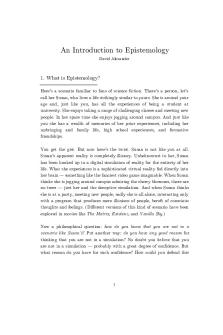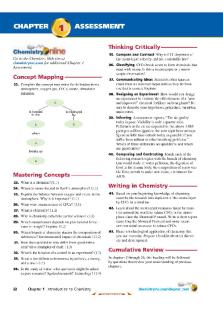Epistemology- Part 1 PDF

| Title | Epistemology- Part 1 |
|---|---|
| Course | Philosophy and Contemporary Ideas |
| Institution | Liberty University |
| Pages | 3 |
| File Size | 71.8 KB |
| File Type | |
| Total Downloads | 19 |
| Total Views | 147 |
Summary
first lecture in epistemology unit- professor Jones ...
Description
Epistemology: Rationalism, Empiricism, Rational Empiricism and Your Worldview
Epistemology
Defined: epistemology is the theory of knowledge. It is the study of nature, means, validity, and limits of human cognition.
Skepticism:
Defined: skepticism is the view that genuine knowledge is probably not possible -probably, real knowledge is beyond the human grasp - you can never be certain, there’s always a possibility that you are probably wrong
Rationalism:
Defined: the view that knowledge ultimately comes from reason rather than experience - Descarte and Plato: important rationalist philosophers - Plato: you cant make sense of your sensory experiences unless you have an idea of things already - Plato: world of forms - “Experiences aren’t self-interpreting, you have to interpret them based on the ideas you already have”- Dr. Jones
Descartes: Famous saying: “cogito ergo sum”- “I think therefore I am”
Descartes believed that because he is thinking he must exist. Because whether he is correct or incorrect about that fact, he remains to exist regardless. - Our thoughts of an infinite and perfect being (God) must exist for our thought of him to exist - Because we are finite and imperfect beings we cannt possibly conceive of a perfect and infinite being without that being having existed and implanting that thought in our heads - I think, therefore I am - I exist Empiricism: Defined: empiricism is the view that al knowledge comes from experience -you cannot know anything outside of experience - Aristotle, John Locke, David Hume Aristotle: everything everything is a combination of matter and forms, that’s how we know what things are - A book is just atoms in the form of a rectangle/square with pages inside, etc. - Experiences write knowledge on the blank slate or “Tabula Rossa” of the mind- John Locke - Barkley said to be a true empiricist, we have to set aside some traditional ideas about experience - We experience the shape, size and weight of an object (its form) but we cannot really experience the matter or atoms that make it up - David Hume- you can’t really experience yourself, you only experience thoughts, feelings, and memorieshe develops the, the cluster theory
2
- To assume that something is caused by something else could be committing the post hoc fallacy. Seeing that A is followed by B does not necessarily mean A caused B. - Rational Empiricism: the view that the mind provides a framework of ideas that makes it possible for us to gain knowledge through experience - Kant: space is not something we experience. We bring the idea of space to our experiences to better understand those experiences - Kant’s “Copernican Revolution” in Epistemology: - The categories of understanding (space, time, causality, etc.) constitute perception rather than being constituted by perception How does this relate to your worldview?
Skepticism is incompatible with Christianity but compatible with Naturalism
Rational empiricism is compatible with Christianity but inexplicable for naturalism
Naturalism
Christianity
Empiricism
Rationalism
Skepticism
Rational empiricism
The concept of innate knowledge is biblical- Gentiles have an innate knowledge of right and wrong
Naturalists have no way of explaining where innate ideas/knowledge come from
3...
Similar Free PDFs

Epistemology- Part 1
- 3 Pages

1. An Introduction to Epistemology
- 10 Pages

Part 1
- 2 Pages

Module 1 - Assessment Part 1
- 2 Pages

Exam #1 Part 1 Review
- 6 Pages

Makalah part 1
- 14 Pages

INCS-615 part 1
- 23 Pages

Part 1 Compact
- 27 Pages

Phlebotomy Part 1
- 4 Pages

Poetry Vocabulary (Part 1)
- 1 Pages

MIPS Programming (Part 1)
- 36 Pages

Theft Part 1 - criminal
- 7 Pages

Listening Part 1
- 2 Pages

Legal Notes PART 1
- 11 Pages
Popular Institutions
- Tinajero National High School - Annex
- Politeknik Caltex Riau
- Yokohama City University
- SGT University
- University of Al-Qadisiyah
- Divine Word College of Vigan
- Techniek College Rotterdam
- Universidade de Santiago
- Universiti Teknologi MARA Cawangan Johor Kampus Pasir Gudang
- Poltekkes Kemenkes Yogyakarta
- Baguio City National High School
- Colegio san marcos
- preparatoria uno
- Centro de Bachillerato Tecnológico Industrial y de Servicios No. 107
- Dalian Maritime University
- Quang Trung Secondary School
- Colegio Tecnológico en Informática
- Corporación Regional de Educación Superior
- Grupo CEDVA
- Dar Al Uloom University
- Centro de Estudios Preuniversitarios de la Universidad Nacional de Ingeniería
- 上智大学
- Aakash International School, Nuna Majara
- San Felipe Neri Catholic School
- Kang Chiao International School - New Taipei City
- Misamis Occidental National High School
- Institución Educativa Escuela Normal Juan Ladrilleros
- Kolehiyo ng Pantukan
- Batanes State College
- Instituto Continental
- Sekolah Menengah Kejuruan Kesehatan Kaltara (Tarakan)
- Colegio de La Inmaculada Concepcion - Cebu

